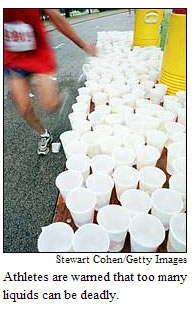May 12, 2005
How many scientists does it take to see a rock rat?
 According to a NYT article by John Noble Wilford, the Wildlife Conservation Society has announced that the Laotian Rock Rat, known to locals as the kha-nyou, represents a new family of mammals, and has been given the scientific name
Laonastes aenigmamus. The NYT article includes a turn of phrase that I found odd:
According to a NYT article by John Noble Wilford, the Wildlife Conservation Society has announced that the Laotian Rock Rat, known to locals as the kha-nyou, represents a new family of mammals, and has been given the scientific name
Laonastes aenigmamus. The NYT article includes a turn of phrase that I found odd:
Dr. Timmins, who is based in Madison, Wis., but concentrates on research in Southeast Asia, said in an interview that he first came on the animals laid out on market tables. Local farmers and hunters trapped or snared the animals, which they also referred to as rock rats, slaughtered them and took them to market. As far as he knew, Dr. Timmins said, no Western scientists have ever seen a kha-nyou alive. [emphasis added]
The phrase "no Western scientists have ever seen a kha-nyou alive" raised two questions for me. First, why Western? do Timmins and/or Wilford mean to imply that some Eastern scientists have observed living kha-nyous? Second, why scientists in the plural -- and kha-nyou in the singular? does it take more than one scientist to see a given rock rat?
The answers to these two questions may be related, and may have little or nothing to do with the structure or meaning of the phase itself.
Timmins and Wilford can't be sure that no Laotian (or other Southeast Asian) scientist has ever seen one of these creatures alive, just as they can't be sure that no western scientist (say some wandering 19th-century French botanist) has seen one either. So since the statement is already qualified by "as far as he knew", why not just say "no scientists"?
Part of the answer is that the passage sets up a contrast between "local farmers and hunters" and "Western scientists", because those are the categories of people involved in the history of the discovery. Of course there are many local farmers and hunters, and there were apparently two scientists who collected specimens in Laos independently around 1990: Robert J. Timmins and Mark F. Robinson. There is little reason for the authors to think about the categories represented by switching the modifiers: Western farmers and hunters are not about to go to Laos in search of rock rats, and local scientists were apparently not involved (though they might well have been).
In the phrase "no Western scientists have ever seen a kha-nyou alive", I suppose that kha-nyou is in the singular in order to emphasize that not even one of them has been seen alive by any scientist. But why doesn't the same logic apply to "no Western scientists"? If no single scientist has seen a kha-nyou alive, then plural scientists have not done so either, though the opposite need not be true.
Well, this compositional choice surely started with the rhetorical opposition between the (many) local rat-catchers and the (two) western scientists. But perhaps another influence was purely linguistic: "western scientists" is a fairly common collocation, with 34,700 web hits on Google, as opposed to "western scientist" with a mere 826. (By contrast, "no scientist" outvotes "no scientists', 49,200 to 9,890.)
If this analysis is correct, then Timmins (or more likely Wilford) started with a implicit opposition between local hunters and western scientists, and then stuck with the plural in "no Western scientists have ever seen...", because "Western scientists" is a statistically amiable bigram.
[Note that I'm not criticizing Wilford's prose here -- the meaning is clear and the choice of plurality in the cited phrase should not really bother anyone. I thought about it for a minute, as people interested in language sometimes do in such cases, and decided that the explanation offered an interesting glimpse of the complex and subtle rhetorical network that ties texts together internally and connects them to general patterns of usage.]
[
 Update 5/14/2005: Gene Buckley emailed a quote from another NYT
story:
Update 5/14/2005: Gene Buckley emailed a quote from another NYT
story:
On the theme of odd plurals, here's a caption from an article in today's Times [5/12/2005], under a photo of many cups of water arrayed on a table:
"Athletes are warned that too many liquids can be deadly."
The idea is "too much liquid", but the writer was apparently thinking about athletes who drink too many cups of liquid in the course of a marathon or the like.
]
Posted by Mark Liberman at May 12, 2005 09:45 AM